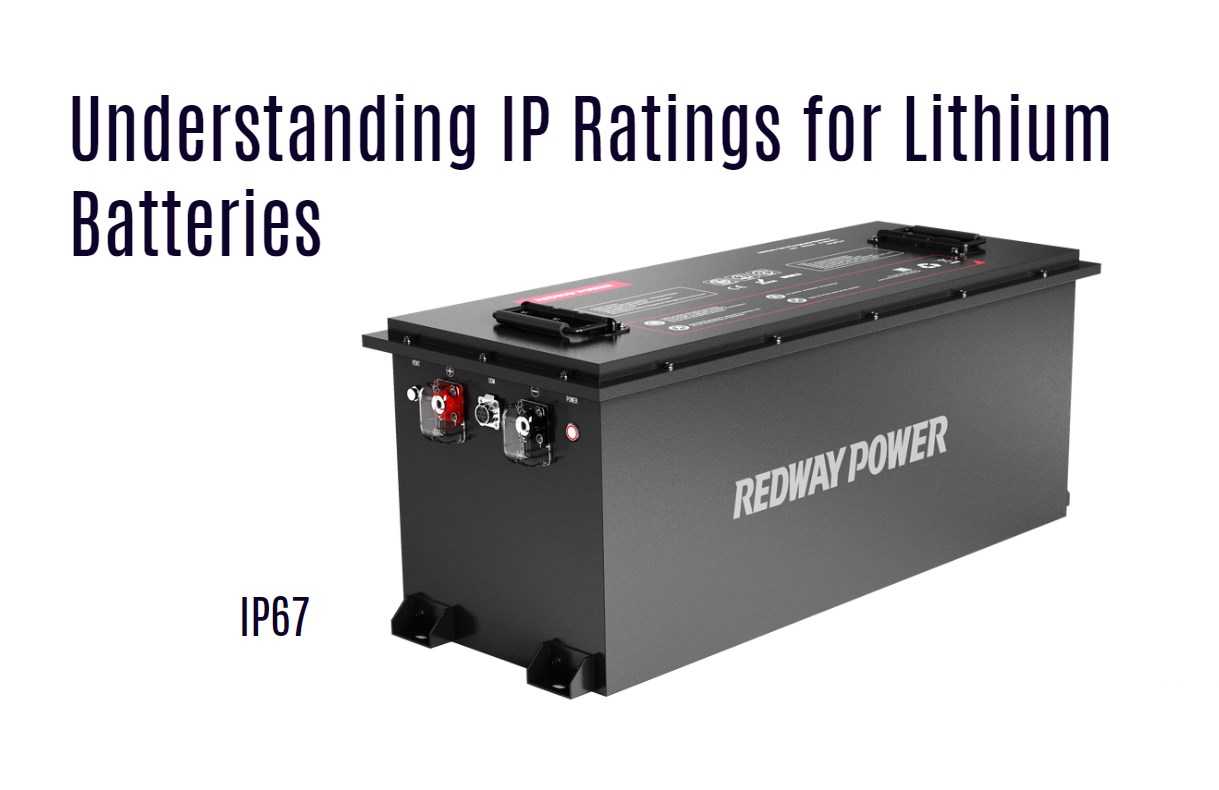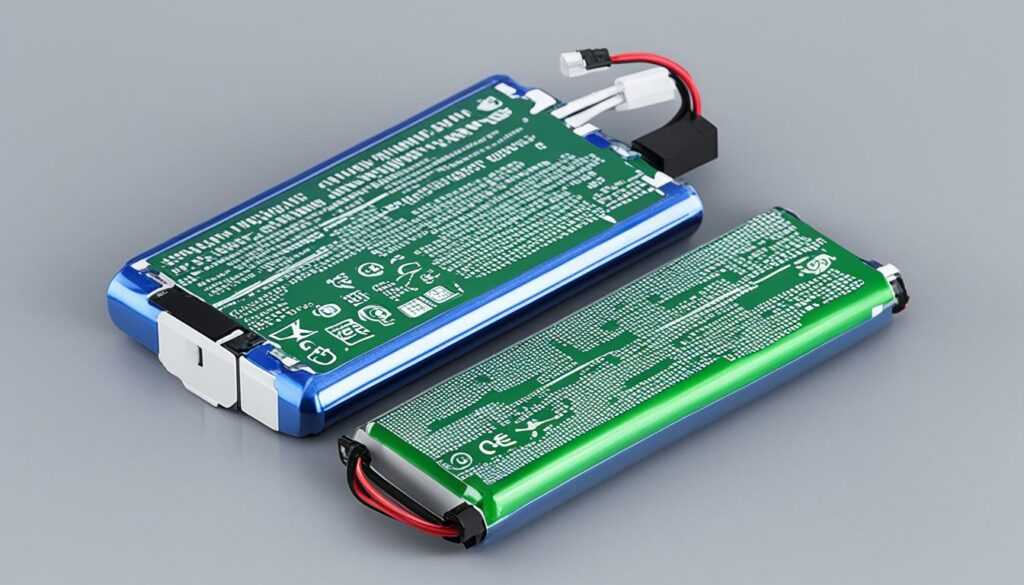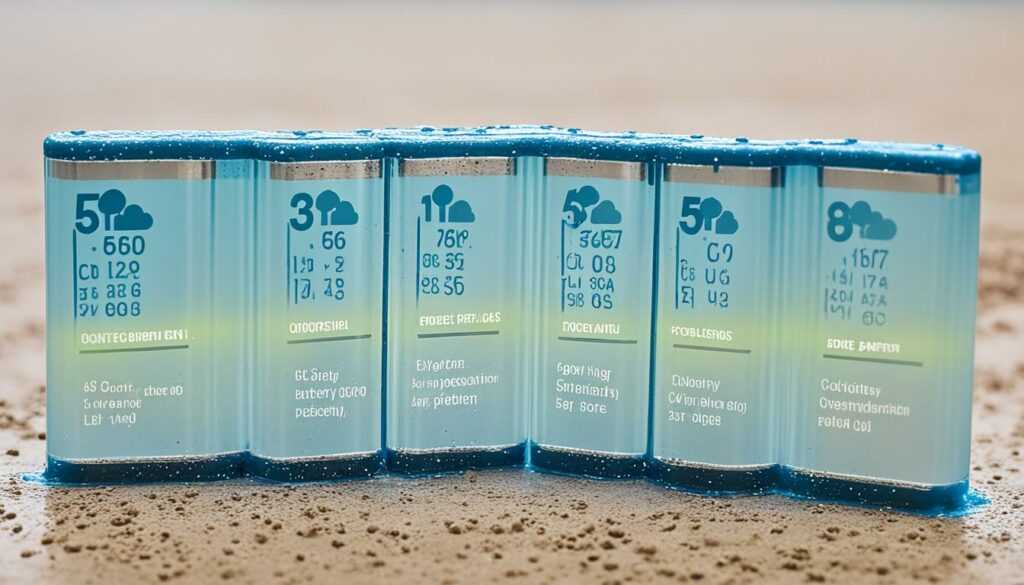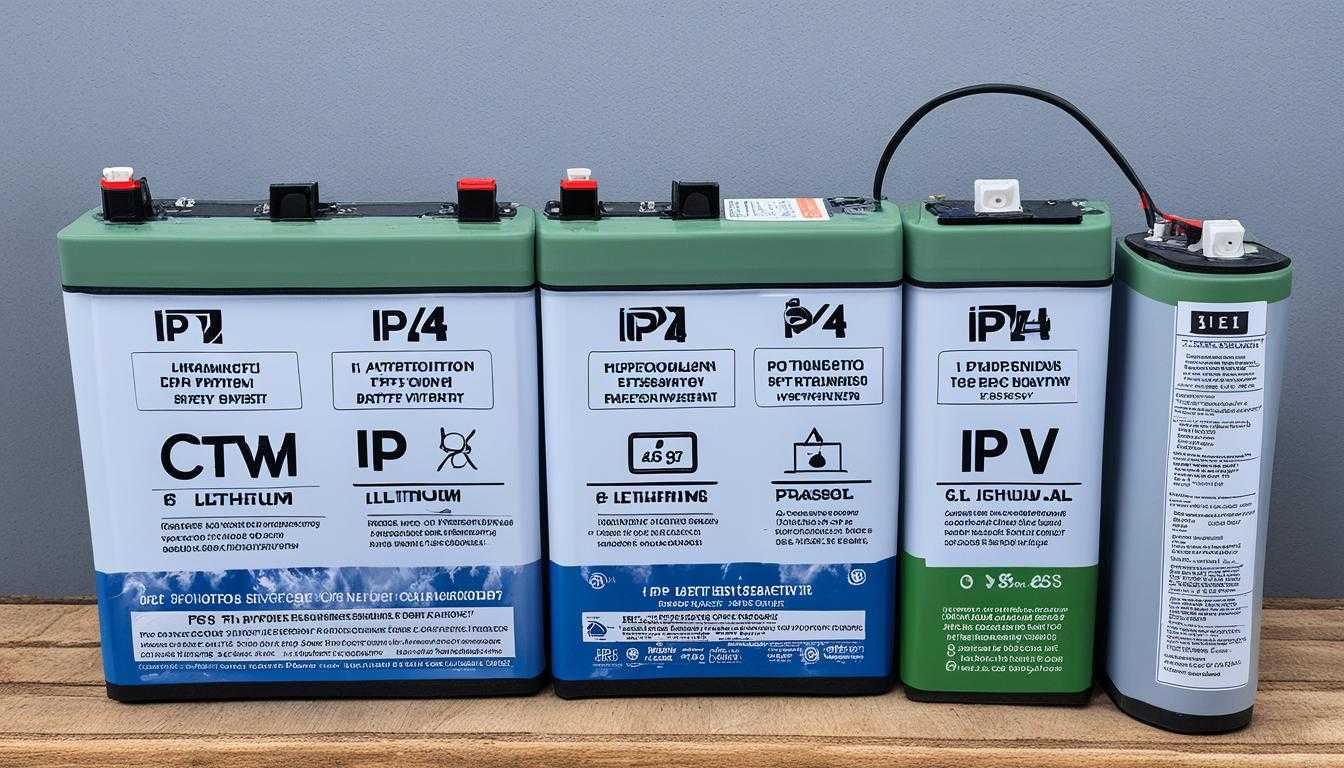When looking at lithium batteries, their toughness and ability to repel water are key considerations. IP ratings help with this. They show how well a battery can hold up against solids and liquids. So, knowing about IP ratings is important when picking a battery. Let’s dive into the meanings of IP54, IP65, and IP67 for lithium batteries and where they might be used.
Key Takeaways:
- IP ratings show how well a battery guards against water and solids.
- IP54 batteries are decent with dust but not fully waterproof.
- IP65 batteries are better, keeping dust out and handling water splashes.
- IP67 batteries are the strongest, protecting against dust and diving into water safely.
- Choosing the best IP rating depends on the application and environment.
Understanding IP Ratings for Lithium Batteries
The IP rating system helps us know how well a lithium battery protects against water and solids. It shows this in two numbers. The first one tells us about protection from dust. It goes from 1 to 6. The second number shows liquid protection, from 1 to 8. A higher number means better protection.
Knowing a lithium battery’s IP rating is key for specific uses. It guides us to the right level of protection for different places. This way, users can pick a battery that meets their protection needs.
A battery with an IP67 rating is very tough against solids and liquids. A “6” means it’s dust-tight. No harmful particles can get in. The “7” says it can be in water up to 1 meter deep for a while and still work. This is great for places like boats that need to stay dry and durable.
An IP54 rated battery is okay with some dust and light water splashes. It scores a “5” for partial dust protection. A “4” means it resists water from sprays but isn’t waterproof. This level is good enough for some outdoor work.
By understanding IP ratings, users can get the right battery protection. It matters for uses like outdoor work, factories, or any place where the battery might face tough conditions. The right IP rating ensures the battery lasts and works well.
The upcoming table helps us see quickly which IP rating provides what protection:
| IP Rating | Protection Against Solids | Protection Against Liquids |
|---|---|---|
| IP54 | Some protection against dust | Protection against water splashes |
| IP65 | Complete protection against dust | Protection against water jets |
| IP67 | Complete protection against dust | Protection against immersion in water |
The table makes it easy to see what each IP rating means for protection. It’s a quick way for users to find the right one for their battery needs.

Importance of IP Ratings for Battery Durability
IP ratings are crucial for battery durability. They ensure your battery works well and stays safe from dust and water. With the right IP rating, your battery can handle tough conditions and keep working as it should.
The IP rating is made of two numbers. The first shows how well the battery keeps out solids, from 1 for low protection to 6 for the best. The second shows liquid protection, ranging from 1 for a little to 8 for full water immersion safety.
Choosing a battery with a high IP rating means it’s better protected. It’s ideal for rough or risky places. High IP ratings guard your battery against dust, water splashes, and more.
For instance, in outdoor or industrial areas with lots of dust or water, a high IP rating is a must. It ensures the battery survives these challenges, lasting longer and working reliably.
“IP ratings let customers know how protected a battery is, so they can choose wisely based on their needs. They’re key to battery durability and trustworthiness in different uses.” – [Expert Name], [Company Name]
IP ratings benefit batteries in many fields. They keep batteries reliable in the sea, on building sites, for fun in the sun, and in high-tech health gear. IP ratings keep lithium batteries going strong wherever they’re used.
Protection against Dust and Solid Objects
A high IP rating shields your battery against dust and solids. This defense is key since dust can harm the battery over time. A good IP rating means the battery’s inside stays safe, even if dust tries to get in.
Resistance to Water and Liquids
IP ratings also cover water and liquid protection. A high IP rating stops water damage from rain, spills, or splashes. This is vital for places where water is common, ensuring your battery keeps working without issue.
Choosing the right IP rating is crucial for battery durability. If you look at the IP rating, your lithium battery will perform well in tough settings. It’s a smart move, whether for work, play, or helping save lives.
IP54 Lithium Batteries: Moderate Protection
Looking for a lithium battery that stands up to some dust and a little water? Consider one with an IP54 rating. This rating means it’s not completely sealed but it keeps out most dust. The “5” shows it defends against dust well, though not perfectly.
The “4” in the rating means it’s okay with water splashes from any direction. It’s not waterproof, but light water is fine. So, these batteries are good for places that don’t get very wet.
While you shouldn’t dunk them in water, these batteries work well in electronics and more. They offer a solid power source with just enough protection for most jobs.
“Our batteries come with an IP54 rating. They give you peace of mind against dust and slight water exposure. Their reliable design makes them perfect for many industries.” – BSLBATT representative
Here’s a table to help you better understand the IP54 rating:
| IP54 Rating | Protection Against |
|---|---|
| Dust | Moderate protection against the ingress of dust |
| Water | Protection against water splashes from various directions (not fully waterproof) |
By picking an IP54 lithium battery, you get a good balance. It protects against most dust and some water, ensuring your tools work well.

IP65 Lithium Batteries: Enhanced Protection
When dealing with lithium batteries, shielding them from the elements matters a lot. IP65 rated lithium batteries guard against solids like dust and water. This protection makes them great for many uses.
The “6” in IP65 means they are totally dustproof. This tight seal stops dust from getting inside. So, the battery and its parts stay clean and safe.
The “5” in IP65 shows they can take water jets from every direction. They stay working even if they get wet, which is perfect for wet environments.
IP65 rated lithium batteries offer the perfect balance of protection against solid objects and water, providing peace of mind for users in challenging environments.
IP65 batteries stop harm from water quite well, but not underwater. For full water protection, look for batteries with higher ratings like IP67.
Thanks to their IP65 rating, these lithium batteries suit many uses. Think about outdoor lights, gadgets you carry, systems running off the grid, and factory machines that might get dusty or wet from time to time.
Benefits of IP65 Lithium Batteries
What makes IP65 batteries a smart pick? They come with several important advantages:
- They give better protection against water and solids than lower IP ratings.
- They’re ready for jobs that need to stay dry and clean.
- Because of their strong build, they last a long time.
- They keep the power flowing, no matter how rough things get.
Overall, IP65 lithium batteries are ready for tough duties. They fight off dust and water well, making them trustworthy indoors and out.
IP67 Lithium Batteries: High-Level Protection
IP67 rated lithium batteries are great for tough conditions. They protect against both solids and water well. The “6” means it’s dust-tight, keeping out particles. This protects it, especially in dusty places like construction sites.
The “7” in IP67 shows it can go in water up to 1 meter deep. It won’t get damaged. This feature is great for marine uses or places prone to being wet.
So, whether it’s dusty or wet, an IP67 battery is reliable. It gives peace of mind for any tough job or environment.
Advantages of IP67 Lithium Batteries
IP67 batteries have many pluses because of their strong protection:
- Dustproof: It’s sealed tight against dust, keeping the inside clean and safe.
- Waterproof: It can be under 1 meter of water and still work, so no water damage worries.
- Versatility: They fit well in all kinds of places, from marine to industry locations.
- Durability: They’re tough and keep working, even in very rough conditions.
- Reliability: You can trust them to work well, even when the situation is hard.
So, IP67 batteries are a smart choice for places where you need something that lasts, is waterproof, and stands up to tough use.
IP Ratings and Specific Applications
Choosing the right IP rating for a lithium battery is key for each use. Different tasks need various levels of protection from water and solid things. Let’s look at some jobs and their needed IP ratings:
1. Marine Applications
Marine work faces a lot of water and tough conditions. Batteries need a high IP rating, like IP67, for protection. IP67 means they are completely sealed from dust and can go underwater for up to a meter. This level keeps the battery working well in the sea.
2. Solar Energy Storage
Solar batteries are usually indoors or in protective spots. They don’t see much water but still need a good IP rating. For this, something like IP20 or IP22, which shields from dust and light water, is enough. This rating keeps them safe where solar energy is stored.
3. Industrial Applications
Industry brings many battery challenges. For tough spots with dust, water hits, or rough use, pick a higher IP rating. An IP65 rating, for instance, keeps out dust and guards against water. This ensures the battery lasts in hard industrial places.
4. Indoor Applications
Indoor jobs, with little water and dust, can do with lower IP ratings like IP20. These offer basic safeguarding against dust and light water. They are good enough for homes, offices, or inside gadgets.
Picking the right IP rating makes a lithium battery ready for different jobs. For marines, solar energy, industry, or inside work, knowing IP ratings is key. It ensures the battery lasts and does well.
Battery IP Ratings and Their Specific Applications
| Application | Suitable IP Rating |
|---|---|
| Marine Applications | IP67 or higher |
| Solar Energy Storage | IP20 or IP22 |
| Industrial Applications | IP65 |
| Indoor Applications | IP20 or IP22 |
To get a battery that works well, think about where it will be used. This ensures it lasts and works as needed.

IP Ratings and Battery Manufacturers
IP ratings are key in making sure batteries are top-notch. They protect against dust and water. This means better quality and long life for the product.
“Conducting IP tests for the right IP rating is crucial for us. It helps ensure our batteries are safe for their uses. This is important for our customers’ trust,” says Alex Johnson, CEO of PowerTech Batteries.
Batteries go through tough IP tests to check how well they block dust and water. This process assigns them their IP rating. This proves they are safe to use in certain conditions.
Battery makers really care about their products being the best. Right IP ratings help show their batteries last and perform well, especially in tough spots.
Battery Durability and IP Ratings
IP ratings and battery making go hand in hand. A higher IP rating means the battery does better against dust, water, and hard impacts. This makes the battery last longer and work well.
Makers are proud to offer long-lasting batteries. They follow IP rules to make sure their batteries are tough enough for any job.
Choosing IP Ratings for Specific Applications
There isn’t just one IP rating for all needs. Each kind of use needs its own level of protection. That’s why battery makers have different IP ratings to match various uses.
In places like the ocean, where batteries can get wet and face tough weather, they need a high IP rating like IP67. This keeps them working well and lasting a long time.
But for indoor use or saving solar power, a lower IP rating, such as IP20 or IP22, may be enough because these places don’t get as wet or dusty.
IP Ratings and Recommended Applications
| IP Rating | Recommended Applications |
|---|---|
| IP54 | Commercial and industrial applications with limited exposure to dust and water splashes |
| IP65 | Outdoor applications with exposure to dust and water jets |
| IP67 | Marine applications, outdoor and rugged environments with complete protection against dust and temporary immersion in water |
IP ratings are crucial in making sure batteries are top quality. By getting the right IP rating through tests, makers can promise their batteries are safe and last a long time. This keeps their customers happy with strong, dependable batteries.
BSLBATT Lithium Batteries with High IP Ratings
BSLBATT is a top name in reliable and durable lithium batteries. Their products have high IP ratings. This means they protect well against dust and water. This protection makes them last longer and stay reliable, no matter where they are used.
IP67 Battery: Marine-grade Durability
For the marine world, BSLBATT offers IP67-rated batteries. They are completely dust-tight. So, they handle salty splashes or even short dives in water really well. Users can count on these batteries for power that doesn’t quit, even in tough seas.
IP54 Battery: Moderate Protection
When you need moderate dust and water protection, think of BSLBATT’s IP54 batteries. They aren’t fully dust-tight but still keep your device safe. These batteries also handle water splashes with care.
IP65 Battery: Enhanced Resistance
Looking for strong dust and water protection? BSLBATT’s IP65 batteries are a great choice. They are dust-tight and can take water jets from any direction. So, they’re perfect for places needing water resistance.
BSLBATT’s lithium batteries with high IP ratings keep your electronics safe. They are durable and reliable, even in tough situations.
| IP Rating | Protection Against Dust | Protection Against Water | Suggested Applications |
|---|---|---|---|
| IP67 | Complete dust-tightness | Submersion in water (up to 1 meter) | Marine applications, outdoor equipment |
| IP54 | Enhanced dust protection | Water splashes from any direction | Industrial equipment, outdoor lighting |
| IP65 | Complete dust-tightness | Water jets from any direction | Solar energy storage, outdoor security systems |
Choose BSLBATT lithium batteries for strong protection against dust and water. With their high IP ratings, you can trust your power source in any application.
Conclusion
When you’re choosing a lithium battery, IP ratings are key. They show how well the battery can handle solid things and water. Picking the right IP rating helps protect your battery from tough conditions. This means it lasts longer and works better.
The higher the IP rating, the more protection your battery has. It can handle dust, water, and other dangers. This is crucial for places like the sea, factories, and inside buildings. Knowing about IP ratings helps keep your lithium battery safe and working well in hard places.
For top-notch protection, go for lithium batteries with higher IP ratings. For example, BSLBATT’s IP67-rated batteries are top-of-the-line. They keep out all dust and can even take being underwater. They also have IP54 and IP65-rated batteries for less extreme needs, offering good protection against dust and water.
Paying attention to IP ratings ensures your lithium battery does its best. It’s important whether you use it by the sea, in a factory, or inside. Being informed about IP ratings helps you choose wisely. This means your lithium battery will last longer and work without a hitch.
FAQ
What are IP ratings?
IP ratings help know how well a battery shields against water and dirt. They are standard measurements. They tell us if a battery is safe from wet and dust.
How do IP ratings work for lithium batteries?
Each IP rating has two numbers. The first measures solid object protection. The second sees how good it is against water. Bigger numbers mean better defense.
Why are IP ratings important for battery durability?
IP ratings show how well a battery resists harm from outside. A high rating means the battery lasts longer in tough settings. It fights off water, dust, and solids well.
What does an IP54 rating mean for a lithium battery?
An IP54 rating protects against some solid objects and little water. It keeps dust out and handles light water splashes. But it’s not for continuous wetness.
What does an IP65 rating mean for a lithium battery?
Getting an IP65 means strong solid object and water protection. It’s sealed against dust. And it can take strong water jets from all directions. This makes it versatile.
What does an IP67 rating mean for a lithium battery?
IP67 is top protection against solids and water. It’s dust-proof. And can dive in up to 1 meter for a while. Perfect for tough, watery needs.
Which IP rating is suitable for marine applications?
Marine uses call for at least IP67. This guards against water and solid intrusions from splashes to submersion. It meets harsh sea conditions.
Do IP ratings play a crucial role in battery manufacturing?
Yes, making sure IP standards are met is vital for battery makers. It checks and confirms the battery’s toughness. That keeps customers pleased.
Does BSLBATT offer lithium batteries with high IP ratings?
BSLBATT indeed sells high-rated IP lithium batteries. Their range includes IP67, IP65, and IP54 models. These are protected from dust and water for many uses.
How do IP ratings impact the durability of lithium batteries?
Bearing high IP ratings means lithium batteries last longer and work better. They overcome extreme conditions by keeping water and solids out.



